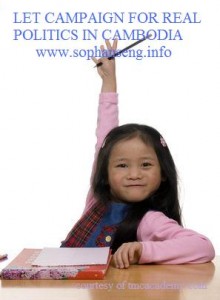Real politics focuses on real factors and current changes of a country. It doesn’t give much value to the past or the ideology of politics. Real politics is contradictory to the politics of memory but it is a base of future politics.
If we talk about real politics in Cambodia, we might concentrate on how we can encapsulate self-reliance on key national fields such as heuristic political domain, economics of sustainable development and development for all, and the independence of judiciary system which can provide trust and just for all Cambodian people. Social security or social wellness needs trusted and just judiciary system.
 At the moment, as a younger Cambodian, I can see that Cambodia cannot lift up its dignity as once it proclaimed a great empire in the region if Cambodian leaders and some Cambodians are still using the past trauma, genocide and previous regimes as their tools to measure the current development. It is very impossible to say that Cambodia today and Cambodia last several decades is in the same pace. Last few decades, economists didn’t use GDP to measure growths. Last several decades, we didn’t have iphone or broad band internet to watch online TVs or all visual video clips etc.
At the moment, as a younger Cambodian, I can see that Cambodia cannot lift up its dignity as once it proclaimed a great empire in the region if Cambodian leaders and some Cambodians are still using the past trauma, genocide and previous regimes as their tools to measure the current development. It is very impossible to say that Cambodia today and Cambodia last several decades is in the same pace. Last few decades, economists didn’t use GDP to measure growths. Last several decades, we didn’t have iphone or broad band internet to watch online TVs or all visual video clips etc.
Wisely speaking and straight to the beneficial points for Cambodia, we must focus on improvement at the present for a better future. The past is just a lesson. It is incomparable to proclaim dignity for current Cambodians by comparing its present capacity to the past.
Hence, Paris Peace Agreement is a fact that we must remind to maintain our progressive conscience. PPA is the foundation for Cambodia. Cambodia can build other important parts of this nation-house because of this foundation. It is not wise to uproot or renege this foundation. Millions of dollar have flowed into Cambodia because of this PPA. The one who has received benefit most from the PPA is the one who has rejected this important foundation. Do you think they are an “ungrateful person” or Khmer called “Akattanno” or not?
